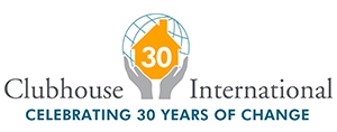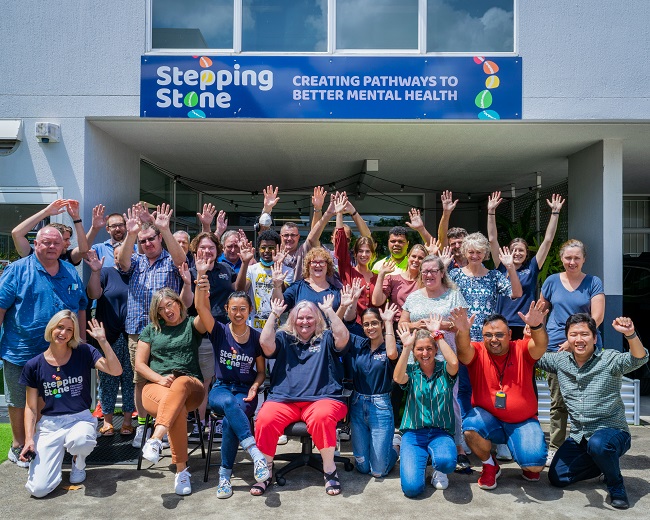
Clubhouse International Celebrates 30 Years of Change
Clubhouse International, the only global non-profit, non-governmental organization that helps communities around the world create sustainable solutions for mental illness, celebrates the 30th Anniversary of its founding in 2024. Download our press release here, or browse our retrospective:
Joel D. Corcoran, CEO and Executive Director of Clubhouse International, marked the organization’s 30th Anniversary by acknowledging the dedication of the organization’s staff, supporters and many volunteers, and saluting the far greater accomplishments of the organization’s member Clubhouses:
“In 30 years, Clubhouse International has succeeded in creating something that didn’t exist before: a worldwide community that is changing the world of mental health. Through ongoing efforts to integrate the Clubhouse Model of psychosocial rehabilitation into community mental health approaches around the world, we are helping to end social and economic isolation for people living with mental illness. Our community offers people living with mental illness opportunities for friendship, employment, housing, education, wellness, and access to medical and psychiatric services in a single caring and safe environment – as they work towards recovery and personally satisfying lives.”
Today, Clubhouse International celebrates 30 years of success in:
Saving Lives Through Our Global Network of Clubhouses

We provide a bridge to recovery at over 370 Clubhouses across 31 countries reaching more than 100,000 members annually. According to available research, Clubhouses achieve the following tangible results for members and their communities:
- Better transitional employment results: longer on-the-job tenure is found to be highly correlated with Clubhouse attendance.1
- Cost effectiveness: at just $40 per member per day, the cost of Clubhouses is estimated to be one-third of the cost of the IPS model; about one-half the annual costs of Community Mental Health Centers; and substantially less than the ACT model.2
- Reduced hospital stays: membership in a Clubhouse has resulted in a significant decrease in the number of hospitalizations.3
- Reduced incarcerations: criminal justice system involvement is substantially diminished during and after Clubhouse psychosocial program membership.4
- Improved well-being: Compared with individuals receiving services as usual, Clubhouse members have been shown to be significantly more likely to report that they had close friendships and someone they could rely on when they needed help.5
Expanding the Adoption and Effectiveness of the Clubhouse Model Worldwide
We ensure successful outcomes for members through Clubhouse Standards and Accreditation. Over the last 30 years:
- Accreditation: Our unique quality assurance program is based on each Clubhouse’s adherence to the International Standards for Clubhouse Programs™, which includes providing ongoing technical training, mentorship and support. Today 70% of all Clubhouses worldwide are accredited.
- Training & Seminars: Clubhouse International helps Clubhouses achieve sustainability through ongoing training and mentoring programs that support both new Clubhouse development and Clubhouse Accreditation.
- Comprehensive Training: we maintain a network of 12 Training Centers located in the U.S., Canada, Europe, Asia and Australia. Since 1994, we have conducted over 3,500 training sessions for over 8,000 individuals
- World Seminars & USA Conferences: We have hosted 15 World Seminars, 5 USA Conferences; training, connecting and engaging with over 11,000 participants.
- Our signature New Clubhouse Development training: To date, we have supported 142 new Clubhouse Startup groups in 15 countries and have provided technical assistance and mentoring to hundreds more.
Achieving Increased Visibility and Acceptance of the Clubhouse Model
Through our partnerships with governments, healthcare providers, mental health advocates, foundations and corporations, and by reflecting the voice of lived experience, we work to broaden recognition of the Clubhouse Model. Recent strides include:
- The Clubhouse Model of psychosocial rehabilitation, and our Training Center, Phoenix Clubhouse in Hong Kong (PRC), are cited as an example of a community-based approach to recovery in the World Health Organization’s Guidance on community mental health services: Promoting person-centered and rights-based approaches.
- The Clubhouse Model was included in the US National Registry of Evidence-Based Programs and Practices—a major milestone for our organization.
- In addition, Clubhouse International has received the following recognitions:
- The 2022 Honorary Pardes Humanitarian Prize in Mental Health awarded by The Brain and Behavior Research Foundation.
- The Special Presidential Commendation Award at the American Psychiatric Association (APA) 2021 Annual Meeting.
- The $1.5 million Conrad N. Hilton Humanitarian Prize in 2014 (jointly awarded to Clubhouse International and our first, and largest Clubhouse, Fountain House NY).
Leveraging Resources
Well over $200 million a year in public and private funding has been provided to Clubhouses in support of people with mental illness.
Ending the Stigma Surrounding Mental Illness
Ending the stigma surrounding mental illness—through our coordinated advocacy efforts with local and regional Clubhouses and Clubhouse Coalitions, and engagement in social, government and mental health forums across the globe.
Corcoran concluded his remarks by saying, “We see a bright future ahead for Clubhouse International and the Clubhouse Model: a world where people living with mental illness everywhere can experience the respect, hope and opportunities found at Clubhouses. We look forward to a better world for mental health.”
Media Inquiries: Anna Sackett Rountree, asackett@clubhouse-intl.org, 1.212.582.0343
Sources: 1 Macias, Kinney and Rodican (1995). 2 McKay, Yates and Johnsen (2005); IPS model reported by Clark et al (1998); ACT model reported by Macias et al (2001). 3 De Masso, Avi-Itzak and Obler (2001). 4 Johnson and Hickey (1999). 5 Warner, Huxley and Berg (1999). 6 Leff and colleagues (2004).

